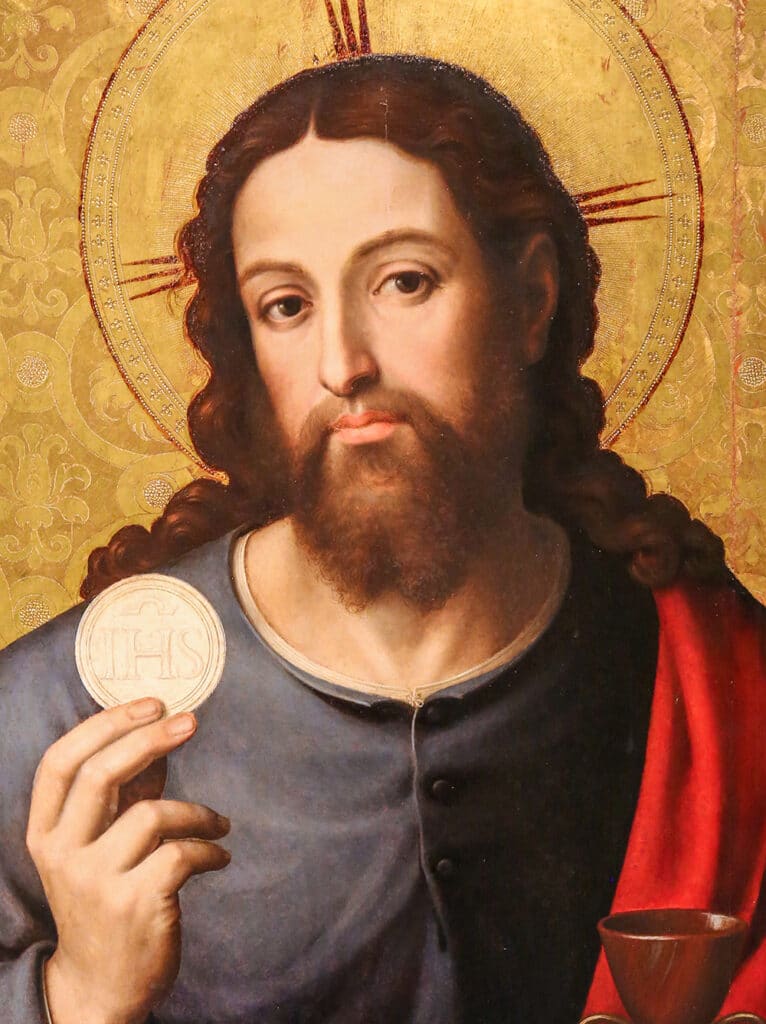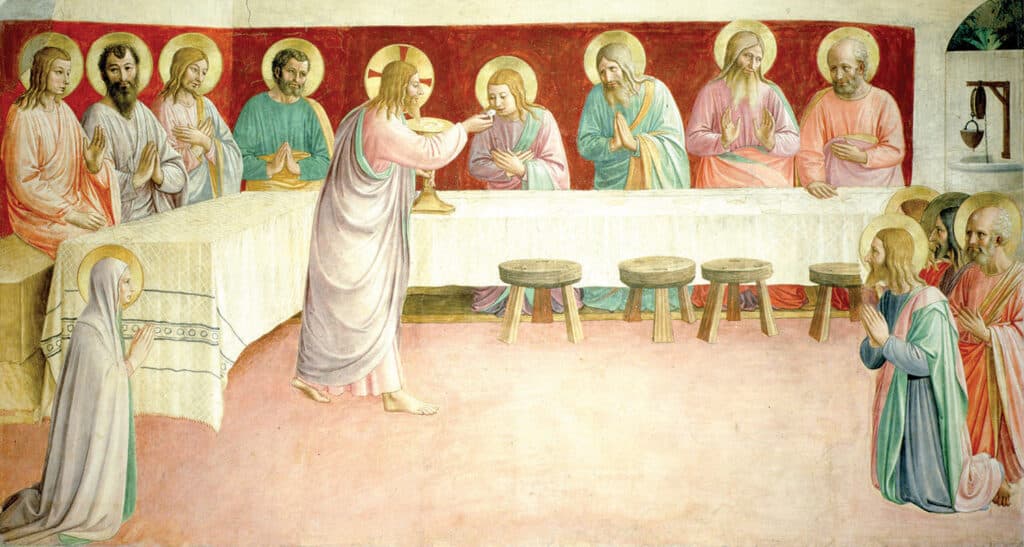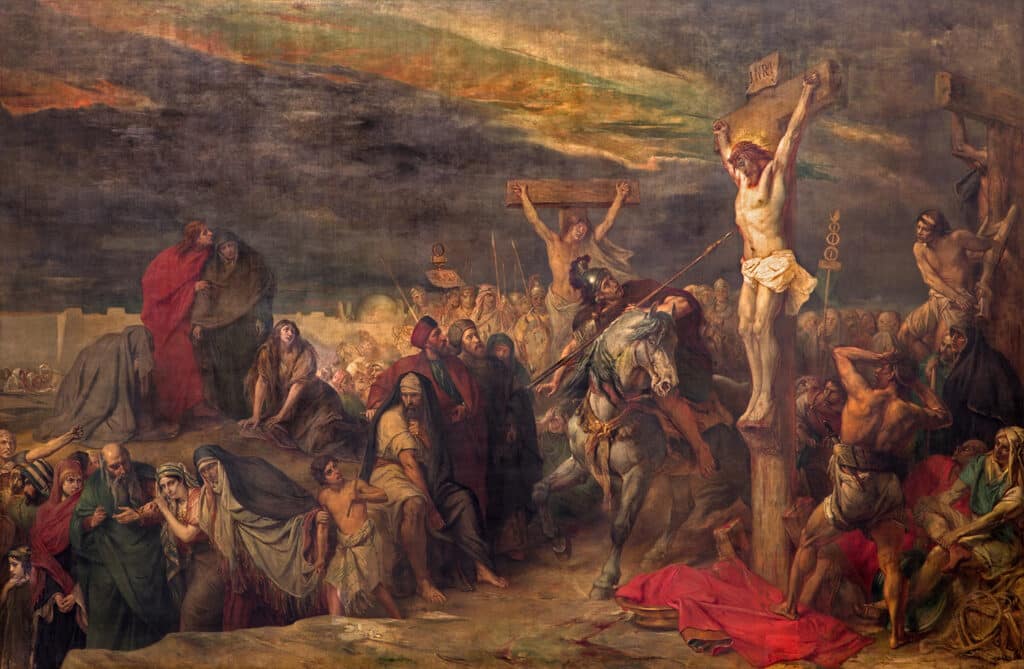It’s arguable, at least, that there is no more important passage in all of Scripture.
The Institution Narrative — the account of Jesus’ establishment of the Eucharist at the Last Supper — appears in varying forms in three of the four Gospels and one of St. Paul’s letters.
1 Corinthians 11:23-34 is unique, moreover, in all the corpus of St. Paul’s letters. It is the apostle’s only detailed narrative of an event in the life of Jesus Christ; and it includes St. Paul’s most extensive quotations of Jesus’ words.
It’s also arguable, at least, that there is no more important passage in Catholic ritual. The Institution Narrative is the essential centerpiece of the Mass — which is itself the “source and summit of Christian life,” according to the Catechism of the Catholic Church (no. 1324).
It’s no accident that this is so. It is design.
No ordinary meal
Of the four Institution Narratives in the New Testament, St. Paul’s is probably the earliest, set down around A.D. 53. It appears in First Corinthians, a letter often numbered — with Romans, Galatians and Second Corinthians — among his most important texts.
All four of those letters share something in common. They are intensely concerned with table fellowship — the behavior of Christians at the Church’s solemn banquet.
Why is that?
Well, Jews were accustomed to observing religious feasts with decorum and reverence. To non-Jews, however, this was a new idea. Religious banquets in the Greco-Roman world were often occasions of drunkenness, gluttony and debauchery.
“Christian partnership is real, and it is not simply a bond with the altar. It is a bond with Jesus.”
St. Paul was concerned that such behavior was creeping into the Christian rites. He heard also that some Christians were excluding entire classes of others. Rich Christians were ignoring the poor. Jews were making Gentiles feel unwelcome.
This was not the spirit Jesus intended for the liturgy, and it’s not what Paul had taught the churches he founded.
Paul wanted Christians to recognize that the Eucharist is not an ordinary meal. That is the recurring theme in his First Letter to the Corinthians. The food on the table is not what it seems to be. It is, rather, what Jesus had promised it would be.
Prefigured in the Old Testament
In his Corinthian correspondence, Paul discusses many things: personal morality, authority, vocation, Christian unity, Church order, tradition and true love. But these matter to him primarily because they relate to his central theme, which is the liturgy.
Long before he approaches the Institution Narrative, he speaks of the sacramental reality of the Eucharist.
He knew that the Mass was no novelty. It had been prefigured in the Old Testament. Christ is foreshadowed in the details of the Passover sacrifice and meal. Christ is the victim, the lamb. Christ is seen in the matzah of the Seder meal. The apostle writes: “For Christ, our paschal lamb, has been sacrificed. Let us, therefore, celebrate the festival, not with the old leaven, the leaven of malice and evil, but with the unleavened bread of sincerity and truth” (1 Corinthians 5:7-8).
The Old Testament also anticipates the Eucharist, Paul says, as it relates the story of the Exodus. The Hebrews “all ate the same supernatural food and all drank the same supernatural drink. For they drank from the supernatural Rock which followed them, and the Rock was Christ” (1 Corinthians 10:3-4).
Christ fulfills all the “types” in Israel’s law and prophets and history. He embodies and reveals their ultimate meaning, intended by God from eternity. He is the Passover lamb, the supernatural food and drink, the unleavened bread of truth.

St. Paul is not dealing here in mere symbols or metaphors.
He states plainly that anyone who offers sacrifice brings about communion, and he shows that this is true not only for Christians, but for Jews and even pagans.
When the Israelites make their offering and consume it, they are “partners in the altar” (1 Corinthians 10:18). When pagans sacrifice to idols, they become “partners with demons” (1 Corinthians 10:20).
Christians, too, have a sacrifice that brings about a “partnership” (in the Greek of St. Paul, koinonia, “communion”). But the Christian partnership is real, and it is not simply a bond with the altar. It is a bond with Jesus. St. Paul says: “The cup of blessing which we bless, is it not a participation (communion) in the blood of Christ? The bread which we break, is it not a participation (communion) in the body of Christ?” (1 Corinthians 10:16).
He is speaking here of a real communion, which he contrasts with the illusory bonds between the pagans and their idols. Again, this is not merely a symbol or metaphor. This is actual, substantial and metaphysical. Christians are those who consume Christ — consume the infinite, eternal Word of God — and enjoy a lasting communion with him. This is the “presence of God,” which Paul mentioned earlier (1:29). This is the “power of God” (1:24).
Implicit in all of this is the sacrificial nature of the Eucharist. In the ancient world, non-sacrificial religion would have seemed a contradiction of terms. Every religion made offerings. What St. Paul is demonstrating is that Christians offer the only sacrifice that is true and efficacious: the sacrifice of the Mass.
As the sacrament makes a believer one with Jesus, so the same sacrament brings about a communion among believers. As St. Paul declares: “Because there is one bread, we who are many are one body, for we all partake of the one bread” (10:17). The Eucharist, then, is the principal cause of unity in the Church. They are one “in Christ” — a prepositional phrase used a dozen times in First Corinthians.
Christians are “sanctified in Christ” (1:2). Grace is given them “in Christ” (1:4). They have “life in Christ” (1:30). They are newborns “in Christ” (3:1). They are wise “in Christ” (3:10). They possess every gift and blessing because they are one with Jesus in holy Communion — and, by the same Communion, they are one with each other in the Church.
For Paul, then, the Eucharist is an efficacious sign. Like all signs, it communicates a message. But ordinary signs do not have the power to bring about what they communicate. A stop sign does not make your car stop. But because the Eucharist is the real presence of Jesus — and because Jesus is God — the sacrament has power to effect what it signifies. It signifies the oneness of God, and it produces unity in the Church. It signifies spiritual nourishment, and it nourishes. It signifies salvation, and it saves.

The moral dimension of the Eucharist
God gives himself freely in the sacramental gift. But the enormity of the gift imposes certain obligations on those who receive it. Paul is adamant about this. Christians must not, for example, “drink the cup of the Lord and the cup of demons” or “partake of the table of the Lord and the table of demons” (10:21). The religious commitment of a Christian must be total and exclusive, as the commitment of marriage is total and exclusive. To attend a meal at a pagan temple would be wrong because it would signify a divided heart. A married man does not date a woman other than his wife. Nor should he appear to date others. A Christian, similarly, should not give the impression of reverence for pagan idols.
Religious commitment is the non-negotiable baseline, but it is not the only moral requirement of a Christian.
St. Paul, early in his letter, discusses an egregious case of immorality in the Corinthian Church. A professing Christian is involved in an incestuous relationship, living openly with his father’s wife (5:1). It is a public scandal. And so the apostle recommends the most severe measure: public rebuke and excommunication. The sinner must be denied communion (with Christ and the congregation) until he repents and ceases sinning in this way. St. Paul intends the punishment to be remedial. He hopes that the man will be driven to repentance, so that “his spirit may be saved in the day of the Lord Jesus” (5:5).
God gives himself freely in the sacramental gift. But the enormity of the gift imposes certain obligations on those who receive it.
Otherwise the sinner will exercise a terrible influence on fellow Christians, tainting the dough (so to speak) of their Eucharistic offering. St. Paul asks the Corinthians: “Do you not know that a little leaven leavens the whole lump?” (5:6). He urges them, then, to “cleanse out the old leaven” (5:7) so that their offering will be pure.
He clearly considers grave sin to be incompatible with the reception of holy Communion. Such an attempt — joining the unholy to the holy — would be blasphemous.
Later in the same letter he calls the congregation to an examination of conscience as he states: “Whoever, therefore, eats the bread or drinks the cup of the Lord in an unworthy manner will be guilty of profaning the body and blood of the Lord” (11:27). He doesn’t argue the point. He assumes they can see such guilt as a logical corollary of Jesus’ real presence. If the Lord is truly present and they disbelieve it, they are apostates. If the Lord is present and they approach him after their unrepented sins, they insult him.
Anyone who presents himself for Communion after grave sin invites severe judgment. Moreover, anyone who disbelieves Jesus’ real presence in the Eucharist, but receives anyway, “eats and drinks judgment upon himself” (11:29).
St. Paul is not mincing words. To receive Communion in the state of mortal sin is, for him, a capital sin, whose ultimate punishment is reserved to God. He says: “That is why many of you are weak and ill, and some have died” (11:30). He sees a causal connection between the Christians’ sinful Communion and their later suffering.
In this context, we can see that the excommunication in chapter 5 was a profoundly merciful act, designed to speed the sinner toward repentance and away from judgment.
Holy Communion, for St. Paul, is an act of ultimate consequence. The liturgy should be conducted, then, with dignity. People should dress appropriately (11:4-15). They should be reconciled to one another (11:18). They should not be gluttonous or drunk (11:21). If they do otherwise than he counsels, then it is not the Lord’s supper that they eat (11:20).
The heart of Paul’s theology
The heart of the letter — and the heart of Paul’s theology — comes in the historical facts that he presents in chapter 11. He wants us to know that what follows is not his personal teaching, but something he has received. By the time he was writing his epistle — by A.D. 53 — the action he was about to describe was well established in the Church. He is simply its steward, its custodian, the one passing on a sacred tradition.
He says: “For I received from the Lord what I also delivered to you, that the Lord Jesus on the night when he was betrayed took bread” (11:23). He will use such language later, in chapter 15, when he speaks of Jesus’ death and resurrection: “For I delivered to you … what I also received” (15:3). He wants us to know that the details that follow — Jesus’ institution of the Eucharist, his death and resurrection — are not matters of opinion or conjecture. They are the most permanent truths in the Church.
What follows, then, is St. Paul’s account of Jesus’ Last Supper. As I mentioned earlier, it is the longest sustained narrative he gives of any event in Jesus’ life, and it includes his most extensive quotations of Jesus’ actual words. This is the narrative of institution, the account of Jesus’ action that established the Eucharist.
[T]he Lord Jesus on the night when he was betrayed took bread and when he had given thanks, he broke it, and said, “This is my body which is for you. Do this in remembrance of me.”
In the same way also the cup, after supper, saying, “This cup is the new covenant in my blood. Do this, as often as you drink it, in remembrance of me.”
For as often as you eat this bread and drink the cup, you proclaim the Lord’s death until he comes.
In all the earth, there is no richer text than this. Here, Jesus offers himself in sacrifice: his body and blood. He commands us also to “do this” as his memorial, his remembrance. The Greek word for remembrance, anamnesis, is used in biblical literature to denote a sacrificial act. It is not a simple psychological exercise of memory. It is a ritual that makes the past present.
When Jesus spoke those words he was presiding over a Passover meal, a Seder. This was, in his time as in ours, a tightly ordered event, scripted in the Haggadah, with prescribed roles for various people in attendance. The menu was always the same. In the course of the meal the leader — usually the father of a family, or a rabbi among his disciples — would bring out the items of food to be consumed, and he would explain their meaning. The bitter herbs, for example, represented the bitterness of the slavery that Israel suffered in Egypt.
In all the earth, there is no richer text than this. Here, Jesus offers himself in sacrifice: his body and blood.
When Jesus arrived at the wine and unleavened bread, however, he was clearly going off script. Or, rather, he is establishing a new script. He speaks not of signs, but of realities. The bread is his body. The wine is his blood. This is the new order for God’s people, and it is to be re-presented “in remembrance” forever.

Establishing a new covenant
It was that action that initiated Jesus’ sacrifice. If he had not done those things and said those words, his death on Calvary would have been a mere execution and not a sacrifice — not a priestly offering.
It would be impossible to exaggerate the significance of the moment. All St. Paul can do is report it as it was and is. He notes that Jesus pronounced the cup to be his “New Covenant” (which is also translated as “New Testament”). That title is so important we now use it to describe and summarize Christianity’s most distinctive sacred book, the latter part of the Bible. Yet this is Jesus’ only utterance of the word.
Thus the New Testament was a sacrament long before it was a document — according to the testimony of St. Paul in the document we call the New Testament.
1 Corinthians 11:23-34
23 For I received from the Lord what I also delivered to you, that the Lord Jesus on the night when he was betrayed took bread, 24 and when he had given thanks, he broke it, and said, "This is my body which is for you. Do this in remembrance of me." 25 In the same way also the cup, after supper, saying, "This cup is the new covenant in my blood. Do this, as often as you drink it, in remembrance of me." 26 For as often as you eat this bread and drink the cup, you proclaim the Lord's death until he comes.
27 Whoever, therefore, eats the bread or drinks the cup of the Lord in an unworthy manner will be guilty of profaning the body and blood of the Lord. 28 Let a man examine himself, and so eat of the bread and drink of the cup. 29 For any one who eats and drinks without discerning the body eats and drinks judgment upon himself. 30 That is why many of you are weak and ill, and some have died. 31 But if we judged ourselves truly, we should not be judged. 32 But when we are judged by the Lord, we are chastened* so that we may not be condemned along with the world.
33 So then, my brethren, when you come together to eat, wait for one another -- 34 if any one is hungry, let him eat at home -- lest you come together to be condemned. About the other things I will give directions when I come.








